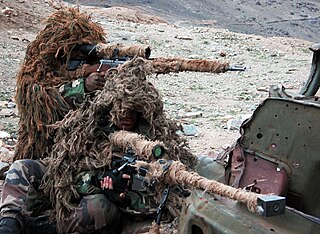Colonel Vladimir Zhitarenko (Russian : Владимир Житаренко; June 15, 1942 – January 1, 1995) was a military correspondent for the Russian armed forces daily Krasnaya Zvezda (Red Star).
Colonel is a senior military officer rank below the brigadier and general officer ranks. However, in some small military forces, such as those of Monaco or the Vatican, colonel is the highest rank. It is also used in some police forces and paramilitary organizations.

Russian is an East Slavic language, which is official in the Russian Federation, Belarus, Kazakhstan and Kyrgyzstan, as well as being widely used throughout Eastern Europe, the Baltic states, the Caucasus and Central Asia. It was the de facto language of the Soviet Union until its dissolution on 25 December 1991. Although nearly three decades have passed since the breakup of the Soviet Union, Russian is used in official capacity or in public life in all the post-Soviet nation-states, as well as in Israel and Mongolia.

A military is a heavily-armed, highly-organised force primarily intended for warfare, also known collectively as armed forces. It is typically officially authorized and maintained by a sovereign state, with its members identifiable by their distinct military uniform. It may consist of one or more military branches such as an Army, Navy, Air Force and in certain countries, Marines and Coast Guard. The main task of the military is usually defined as defence of the state and its interests against external armed threats. Beyond warfare, the military may be employed in additional sanctioned and non-sanctioned functions within the state, including internal security threats, population control, the promotion of a political agenda, emergency services and reconstruction, protecting corporate economic interests, social ceremonies and national honor guards.
Zhitarenko had covered post-Soviet conflicts in Afghanistan, Abkhazia, Chechnya, South Ossetia, Tajikistan and the Transdnester, as well as the nuclear disaster at Chernobyl.

Afghanistan, officially the Islamic Republic of Afghanistan, is a landlocked country located in South-Central Asia. Afghanistan is bordered by Pakistan in the south and east; Iran in the west; Turkmenistan, Uzbekistan, and Tajikistan in the north; and in the far northeast, China. Its territory covers 652,000 square kilometers (252,000 sq mi) and much of it is covered by the Hindu Kush mountain range, which experiences very cold winters. The north consists of fertile plains, while the south-west consists of deserts where temperatures can get very hot in summers. Kabul serves as the capital and its largest city.

Abkhazia, officially the Republic of Abkhazia, is a de facto and partially recognized republic on the eastern coast of the Black Sea, south of the Greater Caucasus mountains, in northwestern Georgia. It covers 8,660 square kilometres (3,340 sq mi) and has a population of around 240,000. Its capital is Sukhumi and it is recognised as a state by Russia, Venezuela, Nicaragua, Nauru and Syria. While Georgia lacks control over Abkhazia, the Georgian government and most United Nations member states consider Abkhazia legally part of Georgia, whose constitution designates the area as the Autonomous Republic of Abkhazia.

Chechnya, officially the Chechen Republic, is a federal subject of Russia.
On December 31, 1994, Zhitarenko was hit by two sniper bullets, including in the head, as he stepped out of an armored personnel carrier on a front line outside the town of Tolstoy-Yurt, near the Chechen capital of Grozny. [1] He died the next day, as the second journalist to die covering the First Chechen War (after Cynthia Elbaum, an American photographer killed during an air raid on Grozny on December 22, 1994).

A sniper is a military/paramilitary marksman who operates to maintain effective visual contact with and engage enemy targets from concealed positions or at distances exceeding the target's detection capabilities. Snipers generally have specialized training and are equipped with high-precision rifles and high-magnification optics, and often feed information back to their units or command headquarters.

A front line in military terminology is the position(s) closest to the area of conflict of an armed force's personnel and equipment, generally referring to maritime or land forces. When a front between opposing sides form, the front line is the area where the armies are engaged in conflict, especially the line of contact between the opposing forces. In a military conflict, then, when facing the front line, you face the enemy.

Grozny is the capital city of Chechnya, Russia. The city lies on the Sunzha River. According to the 2010 Census, it had a population of 271,573; up from 210,720 recorded in the 2002 Census, but still only about two-thirds of 399,688 recorded in the 1989 Census. It was previously known as Groznaya.






